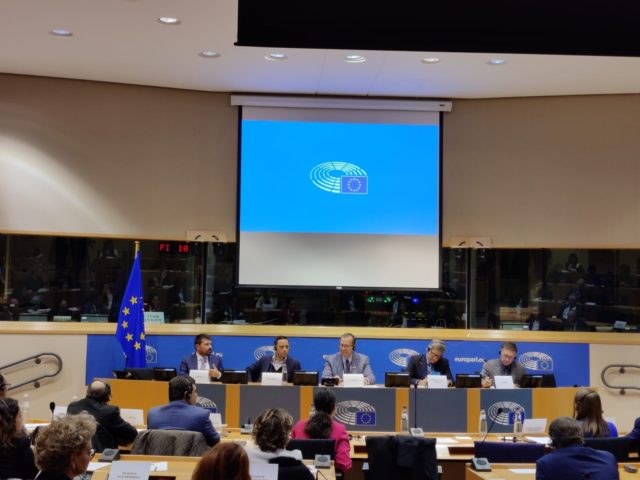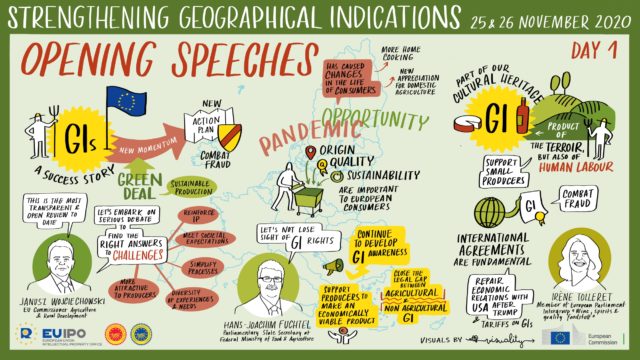On May 20th, the European Commission presented the Farm to Fork and Biodiversity strategies, respectively aiming to create more sustainable food systems and to halt biodiversity loss in the European Union. With their set of actions and commitments declared as ambitious, they should be the core of the European Green Deal as well as a key element of the EU recovery plan, paving a new way to restart EU economy after the Coronavirus, with the need for a “robust and resilient food system that continues to function in all circumstances, capable of ensuring access to a sufficient supply of affordable food for citizens.”
AREPO welcomes the publication of the two strategies, aware of Geographical Indications’ (GI) contribution to sustainable rural development and resilience of rural and marginal areas together with their potential in terms of protection of rural landscape and conservation of biodiversity. Therefore, we are pleased to note that, among the 27 actions proposed in particular by the Farm to Fork strategy, some are geared to the overall Commission’s priority of strengthening the system of GIs.
As a matter of fact, the Commission intends to strengthen the legislative framework on GIs and, where appropriate, include specific sustainability criteria (Action 18). This could help to recognise and promote GIs participation in environmental, social and economic sustainability. Nevertheless, care must be taken not to jeopardise the legal justification for GIs exceptionality under intellectual property law, i.e. the link to the territory. Furthermore, in the framework of actions concerning Competition rules (Action 10 and 11) the Commission is committed to work with co-legislators to improve agricultural rules that strengthen the position of farmers in the food supply chain, like EU quality schemes. Combating food fraud along the food supply chain (Action 19) will also have a positive effect on GIs sector.
With the aim of providing clear information on healthy and sustainable foods and empower consumers, it also lays stress on improved labelling. In 2022, a proposal for a harmonised mandatory front-of-pack nutrition labelling (Action 20) will be published and the EC will work on a proposal to extend mandatory origin indication to certain products (Action 21). Finally, the EC will also examine ways to harmonise voluntary green claims and to create a sustainable food labelling framework that covers the nutritional, climate, environmental and social aspects of food products (Action 23).
Though recognising the importance of providing accurate and complete information to consumers, the risk of an oversimplified information on the products should be born in mind, especially as concerns nutrient profiles and nutrition labelling. Actions heading to healthy and sustainable food choices should privilege a balanced diet approach and not be limited to the analysis of fat, sugars and salt content. Nutrient profiles leading to product reformulation (Action 15 and 16), threaten to alter the very nature of products like GIs, resulting from traditional know-how and production techniques.
Likewise, regarding the enhancement of Promotion Policy contribution to sustainable production and consumption (Action 24), carbon-efficiency should not be used as the main criteria to measure sustainability. A holistic approach is needed, taking into account all the dimensions of sustainability. Products like GIs, covered as priorities by this strategy and often associated with the production of several public goods, should be considered as best practices for production in the future European sustainable food system.
Furthermore, in order to improve the availability and price of sustainable food and to promote healthy and sustainable diets in institutional catering, the Commission plans to determine the best modalities for setting minimum mandatory criteria for sustainable food procurement (Action 22). The definition of minimum mandatory criteria should help cities, regions and public authorities to source sustainable food for public canteen and will boost, indirectly, sustainable farming systems.
By 2030, the EU’s new flagship food policy proposes a reduction by 50% of the use and risk of pesticides, a reduction by at least 20% of the use of fertilizers, a reduction by 50% in sales of antimicrobials used for farmed animals and aquaculture, and reaching 25% of agricultural land under organic farming.
Finally, the Commission will make a legislative proposal for a framework for a sustainable food system before the end of 2023 (Action 1). The framework will contain common definitions and general principles and requirements for sustainable food systems and foods. Furthermore, it will address the responsibilities of all actors in the food system.
AREPO is committed to work along with the Commission and the other EU Institutions to ensure that the right place and recognition is guaranteed to geographical indications and quality schemes for agri-food and wine products.
Useful links:
Farm to Fork: download the full communication here. More documents and explainers available here.
Click here to consult AREPO feedback to the Roadmap published on February 2020.




